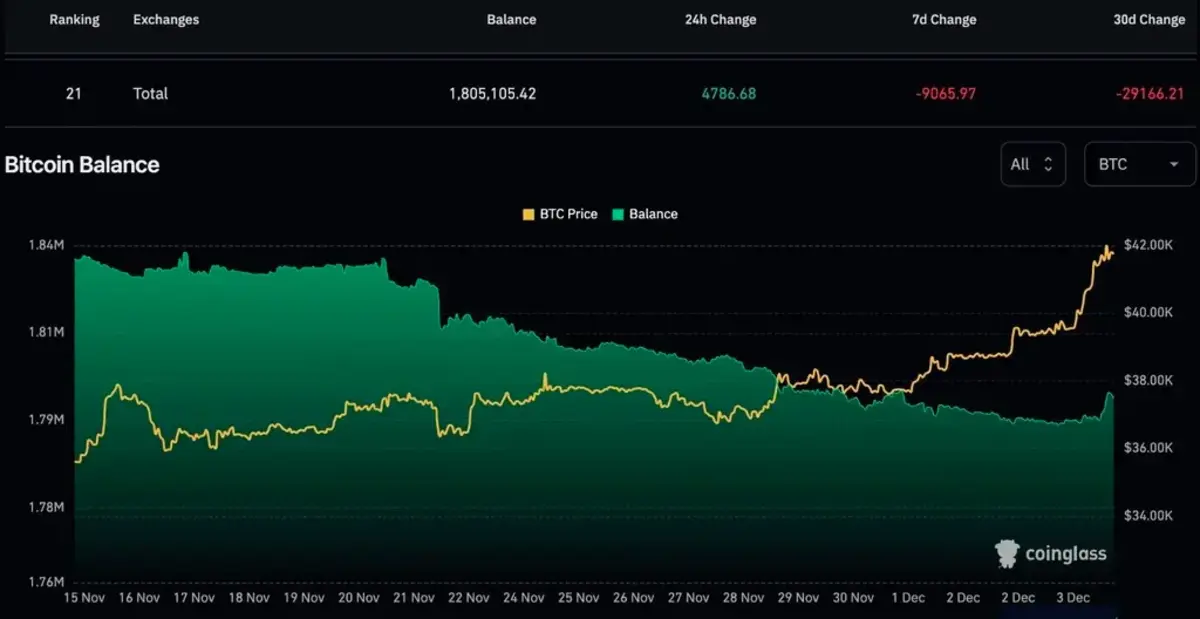The below is an excerpt from a recent edition of Bitcoin Magazine Pro, Bitcoin Magazine's premium markets newsletter. To be among the first to receive these insights and other on-chain bitcoin market analysis straight to your inbox, subscribe now.

Despite a few apparent setbacks, like the change of leadership at Binance, Bitcoin’s ongoing upward trend is turning into a runaway success as the price has crossed the $40,000 mark.
Things have been going well for Bitcoin as of late. Not only has the general trend in its valuation been a steady increase throughout the entirety of 2023, but September has also seen this steady growth kick up a notch. Although there are sometimes claims that this growth will taper off or reverse, the beginning of December has shown that quite the opposite is true: It’s looking like a real bull market out there. At the beginning of September, it was valued at $25,000 and it crossed the $40,000 mark shortly into December.
One of the most obvious signals that the hype train would slow down has been the events at Binance. Although it was the world’s largest digital asset exchange in November, the company has pled guilty to financial crimes in the US, prompting the CEO’s exit and billion-dollar fees on top of this exchange losing its crown. As competitors have moved in to take bites out of Coinbase’s market share, one question has stood out to skeptics: Why isn’t Bitcoin hurting more? When the world’s number one exchange has failed in the industry, like with Mt. Gox or FTX, it has often taken a severe bite out of bitcoin. “Crypto” seems to be hurting badly right now, but bitcoin’s looking shinier than it has in a year and a half. Where did this sturdiness come from, in such an otherwise volatile asset?
The most commonly-cited reason for all this success has been the continued sense of impending victory on a Bitcoin spot ETF. The ETF, or exchange-traded fund, is a new financial instrument whose valuation is tied directly to bitcoin, and would have a very wide reach into American markets. Although anyone can purchase bitcoin, the ETF would mark a whole new level of prestige and acceptance: Anyone could buy them without understanding or even being fully aware of the concept of self-custody, such as if a pension or mutual fund bought in. Although the SEC has continued to drag their feet on a firm acceptance, it is generally believed that the fight is nearing the end. Bloomberg, for example, openly cites the ETF as a reason to predict a $500,000 bitcoin price by the end of the upcoming cycle.
Bitcoin Magazine Pro is a reader-supported publication. To receive new posts and support our work, consider becoming a free or paid subscriber.
There’s more to this belief than a mere collective fantasy, however. Although it is difficult for an unelected board like the SEC to be directly swayed by popular opinion, there is real power coming to bear on the side of the Bitcoin ETF. For example, the world’s largest asset manager, BlackRock has had a sustained prominent role in the ETF fight, filing one of the first petitions to the SEC and throwing its weight into the legal battle. On December 5, it was made public that it had received a shot in the arm: On October 27, a single unknown investor gave the company $100,000 to add to its war chest.
Cases like this have shown the real staying power of Bitcoin, as these larger institutions have contributed to an overall sense of optimism that can be measured in many distinct ways. For example, the desire to “hodl” bitcoin, and refuse to sell them for years at a time, has been treated as gospel by many Bitcoiners. This has evidently been quietly growing over the past few months: In August, when the rally hadn’t even started, it was revealed that bitcoin holdings on major exchanges had fallen to the lowest level in five years. In the intervening months of success, however, the trend has exploded.

Coinglass
An increase in self-custody like this could point to a few different trends. First of all, especially in light of the events at Binance, it could simply mean that growing numbers of Bitcoiners wish to take advantage of the blockchain’s radical options for self-custody. Why keep your money on an exchange if you don’t need to? The important thing to notice is that the trend is to pull bitcoin out of exchanges for self-custody, not to simply sell it off for fiat. In other words, people expect its value to continue increasing, and they expect it so thoroughly that it’s becoming harder and harder to find anyone selling. And as it seems from these price moves, it’s a smart move to make.
In this space, some positive moves have a way of feeding into each other. Although Bitcoin’s technology obviously has revolutionary implications on the monetary system worldwide, it doesn’t hurt when the speculative value is doing well, too. Take, for example, the case of El Salvador, a Central American nation that shocked the world when it made bitcoin legal tender. There have been many benefits such as tourism dollars rolling in and new jobs coming with a nascent digital asset industry. However, the nation has also invested directly into bitcoin, and it’s been a topic of mockery for much of the establishment press. With bitcoin “failing” and “bombing,” there has been “little to show” from the nation’s investment in terms of dollars and cents.
Now, however, Salvadoran President Bukele is proud to claim that “El Salvador’s Bitcoin investments are in the black!” Despite “literally thousands of articles and hit pieces that ridiculed our supposed losses,” he said, “if we were to sell our bitcoin, we would not only recover 100% of our investment, but also make a profit of $3,620,277.13 USD (as of this moment).” He added, of course, that the government has no plans to sell off any of it. El Salvador has been purchasing bitcoin at a steady rate, and it’s a true mark of success that the nation can call even this decision vindicated. The new jobs and tourists will come either way, but surely it’s best to prove the haters wrong, after all.
In short, it’s an extremely positive sign that bitcoin is doing this well in this environment, enjoying some of the best news that it’s had in years. Some of the biggest rallies, like in 2017 and 2021, came on quickly with few signs of this success. We have some undeniable signs right now. Bitcoin has had a few months where the “crypto industry” has seen real rattles, and the world’s leading digital asset has barely noticed. It is important to remember that some of the biggest collapses have happened without warning too, and many have been directly caused by the exact same type of troubles that Bitcoin can skate past now. Who knows where we’ll be when the ETF is approved? Who knows what kind of benefits will come to the entire world? In any event, a more resilient Bitcoin is prepared to move into the future, and it’s looking very bright indeed.











